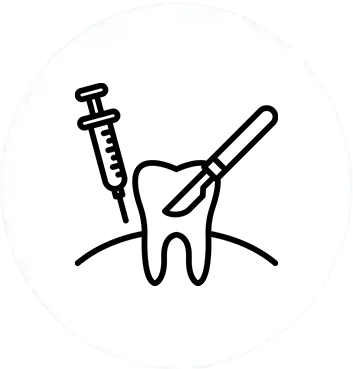Oral surgery is a specialized branch of dentistry that focuses on diagnosing and treating complex conditions affecting the mouth, teeth, gums, and jaw. It involves surgical interventions for various dental and maxillofacial issues that go beyond the scope of routine dental care.
Oral surgery plays a vital role in maintaining optimal dental health and addressing complex issuesthat go beyond the scope of general dentistry.AtWest Valley Natural Dentistry, we arecommitted to providing top-tier surgical care that aligns with our holistic philosophy.Our team specializes ina range oforal surgical procedures, including wisdom teeth removal, routine and surgical extractions, removal of endodontically treated teeth, and cavitation surgery.
Common Oral Surgery Procedures
Wisdom Teeth Removal
Wisdom teeth, or third molars, typically emerge betweenthe ages of17 and 25. While some individuals experience no issues with their wisdom teeth, others encounter problems that necessitate removal. Common complications include overcrowding, impaction, infection, or decay.
Why Wisdom Teeth Are Removed
- Impaction: Wisdom teeth often become trapped in the jawbone or gums, causing pain, swelling, or infection.
- Overcrowding: Their eruption can push existing teeth out of alignment.
- Decay and Gum Disease: Their location makes them hard to clean, increasing the risk of cavities and periodontal issues.
- Cyst Formation: Impacted teeth may develop cysts,which can damagesurrounding bone and tissue.
Procedure Overview
- Consultation: An initial exam and X-rays determine the position of the wisdom teeth and the necessity of removal.
- Anesthesia Options: We offer local anesthesia, sedation, or general anesthesia to ensureyourcomfort.
- Surgical Process: The procedure involves making a small incision in the gum, removing any obstructing bone, and extracting the tooth.
- Recovery: Healing typically takes about one to two weeks. Patientsare advised tofollow post-operative care instructions to minimize discomfort and prevent complications.
Routine and Surgical Extractions
Tooth extractions may be necessary when a tooth is severely damaged or poses a risk to overall oral health. Extractions can be categorized as either routine or surgical.
Routine Extractions
Routine extractions are performed on teeth that are fully erupted and easily accessible.
Common Reasons:
- Severe decay beyond repair
- Advanced gum disease-causing tooth loosening
- Preparation for orthodontic treatment
Procedure:
- Local anesthesia is administered to numb the area.
- The dentist uses specialized tools to loosen and remove the tooth.
- A gauze is placed to control bleeding, and aftercare instructions are provided. Contact us to learn more.
Surgical Extractions
Surgical extractions are more complex and involve teeth that are impacted, broken, or not fully erupted.
Common Scenarios:
- Broken teeth below the gum line
- Teeth with curved or long roots
- Impacted teeth not related to wisdom teeth
Procedure:
- A small incision is made in the gum to access the tooth.
- Bone tissue may be removed to allow for tooth extraction.
- The tooth might be sectioned into smaller pieces for easierremoval
Removal of Endodontically Treated Teeth
Teeththat have undergoneroot canal therapy (endodontic treatment) may sometimes need removal due to reinfection, fracture, or failure to integrate with adjacent teeth.
Why Remove Endodontically Treated Teeth?
- Persistent Infection: Despite treatment, bacteria can persist, causing pain and swelling.
- Structural Weakness: Treated teeth are more brittle and prone to fractures.
- Bone Loss: Chronic infection can lead to significant bone deterioration.
Procedure
- A thorough assessment using 3D imaging determines the tooth’s condition and extraction approach.
- Local or sedation anesthesia ensures a pain-free experience.
- The tooth is carefully removed to preserve the surrounding bone and tissue.
Replacement Options
Post-extraction, we offer holistic solutions such as biocompatible implants or natural-looking bridges to restore functionality and aesthetics.
Cavitation Surgery
Cavitation surgery addresses chronic infections or voids in the jawbone, often caused by incomplete healing after extractions. These areas, known as cavitations, can harbor harmful bacteria, leading to systemic health issues.
Understanding Cavitations
Cavitations are pockets of necrotic bone tissue resulting from improper blood flow or incomplete removal of periodontal ligament during tooth extraction. Symptoms may include:
- Chronic pain or discomfort in the jaw
- Unexplained dental sensitivity
- Systemic symptoms such as fatigue or headaches
Holistic Diagnosis
We use advanced imaging techniques, such as 3D cone beam CT scans, to identify cavitations. Additionally, we consider patient symptoms and medical history to provide a comprehensive diagnosis.
Surgical Process
- Preparation: The surgical site is numbed with local anesthesia.
- Cleaning: The necrotic tissue is removed, and the area is thoroughly debrided.
- Regeneration: Holistic materials, such as platelet-rich fibrin (PRF) or bone grafts, maybe used tostimulate healing and bone regeneration.
Benefits of Cavitation Surgery
- Alleviates chronic pain
- Reduces systemic bacterial load
- Promotes proper bone healing
Conclusion
At West Valley Natural Dentistry, your health and well-being are our top priorities. Whether you need wisdom teeth removal, routine extractions, or specialized cavitation surgery, we are here to guide you through every step with expertise and compassion. Contact us today to schedule your consultation and experience the difference in holistic dental care.
Call us at West Valley Natural Dentistry or schedule an online appointment to know more about oral surgery procedures.
